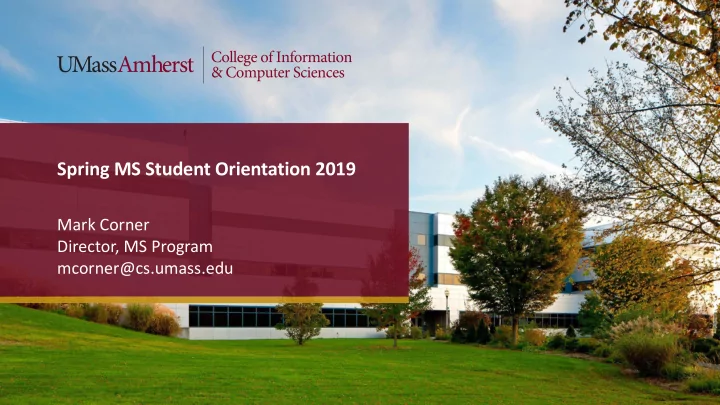

Spring MS Student Orientation 2019 Mark Corner Director, MS Program mcorner@cs.umass.edu
Overview • Advising Advisors, Funding, Terminal/Research MS • • Department Life Buildings/offices, Talks and seminars, Careers • • Courses Requirements, Core Courses, Planning your schedule •
Your academic advisor • All MS students have Mark Corner (me) as their advisor I currently advise 394 students • • To make an appointment, email me: mcorner@cs.umass.edu • Eileen Hamel can answer questions as well: ehamel@cs.umass.edu
Professional vs. Research Track Professional MS (“Terminal MS”) Research Track MS • Stop after receiving MS degree • Intend to complete a PhD after the MS • Take more 500-level courses • Take more 600-level courses • Focus on coursework • Focus on research opportunities
Funding NOT available to you Available to you • Assistantships • “Grader” Positions • TA Positions • Hourly Positions • RA Positions • Check Handshake • Check UMass Job Board • Fellowships • Harder to find to for MS-only students, but they exist
Spaces to know • CICS Building Main office • Eileen’s office • Professors’ offices • • Lederle Graduate Research Center (LGRC lowrise) Professors’ offices • Masters student space – A208 •
Research talks • Usually there is at least one per week • Find more information on the CICS Events page • Look out for seminars about graduate student life and professionalism
Careers and Internships • Director of CICS Careers: Brian Krusell, office: LGRC A243 • Tech Jobs & Internships Fair: Sept 27 in the Campus Center • www.cics.umass.edu/careers
Internship using CPT- International Students Only • We encourage you to do a CPT over the summer • You must have completed 2 semesters at UMass before beginning a CPT • You must be enrolled full time if you are doing a CPT during the fall or spring semester. (limited to one online course per semester) And be physically present here •
Requirements for the MS degree • 30 credits of coursework at the 500+ level • 4 core classes • At least 12 non-independent study credits at the 600+ level • No more than 9 credits outside of CMPSCI (CICS and INFOSEC are outside) • Need a C or better in all classes, B or better in core classes • Overall GPA of 3.0 or better in the 30 credits you use to graduate
Core classes • Must take one from each area Theory A.I. Systems Choice AI • Systems • Theory • • Plus one more from any area
Placing out of core requirements • Sometimes you can place out of a core We do not want you to repeat graduate work you have already • • Speak to the professor teaching the course • Placing out does not give you transcript credits
Possible coursework plan (two years) • First year, fall • 9 credits: One core and two non-cores First year, spring • 9 credits: Two cores (different areas) and one non-core • Second year, fall • 9 credits: One core and two non-cores • Second year, spring (students often try to avoid this using a summer course) • 3 credits: one non-core • You’re probably looking for a job • We recommend spreading out your core courses •
Independent Study and Projects • Optional • 696: Independent Study (requires one reader) 3 credits, can do twice • • 701: Master’s project (requires two readers) 6 credits taken in one semester, work is typically spread out over two • does not count as an independent study, so you can use for 600-level course • • We do not have a MS Thesis option
Registering for classes • If you have not done so yet, register for classes ASAP http://spire.umass.edu • • Many classes are full at this point – use the waitlist • Please register for enough credits that you are NOT on the waitlist for
Academic Honesty • Academic honesty is expected and required. • In coursework, everything you hand in must be your own work. Do not collaborate if collaboration is not permitted. • In research, everything you write or present must be yours or your collaborators’ and/or be appropriately cited. • Cheating/plagiarism will not be tolerated. • The University has policies for academic honesty and research misconduct.
Recommend
More recommend